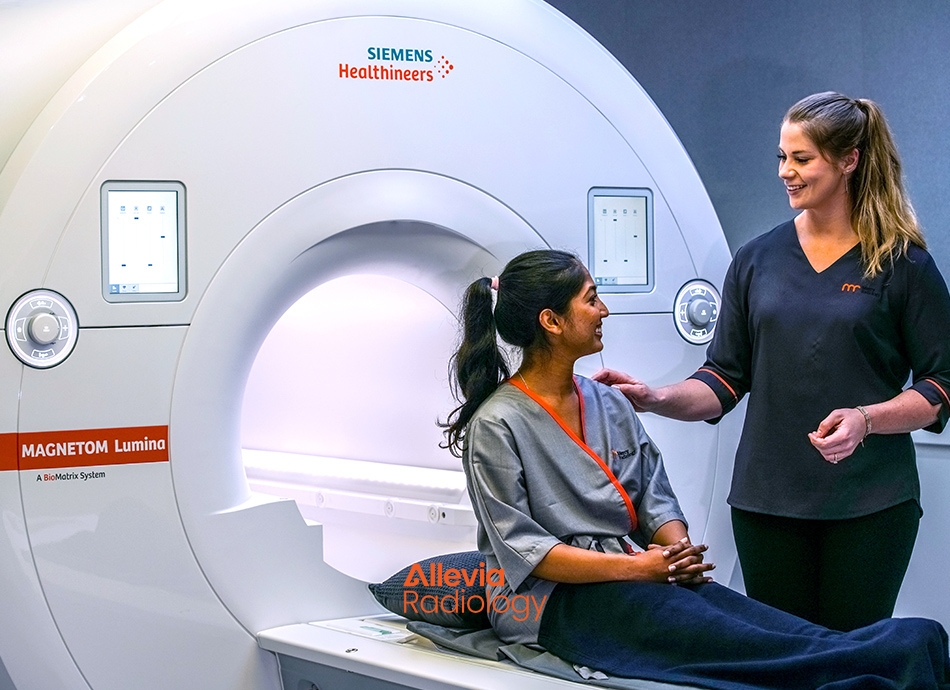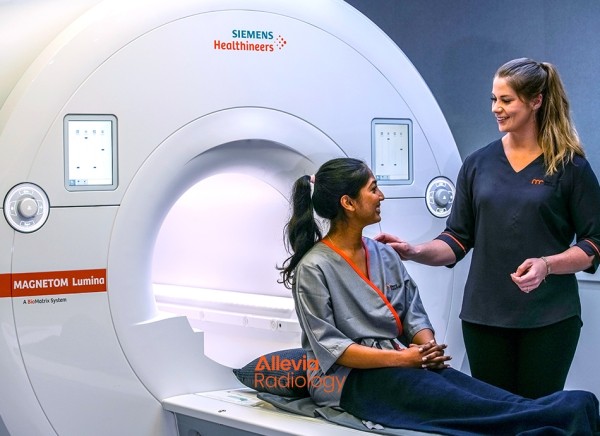MRI scan
Also known as magnetic resonance imaging
Key points about MRI scan
- Magnetic resonance imaging (MRI) is a type of scan used to look inside your body using a strong magnetic field and radio waves.
- An MRI can examine many parts of your body, including your brain and spinal cord, bones and joints, breasts, heart and blood vessels and internal organs.
- MRIs are used for diagnosis, to plan treatment and to evaluate how effective treatments have been.

Magnetic resonance imaging (MRI) is an imaging technology that produces three-dimensional (3D) images of the inside of your body. It uses a powerful magnet and radio waves to generate signals from your body. These signals are then picked up by a radio antenna and processed by a computer to produce images. The MRI takes 30 to 90 minutes depending on which part of your body is being scanned.
Video: What to expect – MRI scan
An MRI is performed to get a better, more precise look at your insides and can sometimes also help avoid more unpleasant tests. It's great for detecting many conditions in your brain and spine, mainly looking for nerve pathology. It can also be excellent for diagnosing most sports injuries as it can demonstrate joints, cartilage, meniscus, tendons and ligaments well.
It can be used to examine many parts of your body, including your:
-
- brain and spinal cord
- bones and joints
- breasts
- heart and blood vessels
- internal organs, eg, liver, uterus or prostate gland
- tumours and other lesions.
An MRI scan can be done to help diagnose conditions, plan treatments and check how effective previous treatment has been.

Image credit: Allevia Radiology
Food and drink before the scan
You may have to stop eating (fast) for a few hours before your MRI, but you will be told ahead of time if this is needed.
Your regular medicines
Take your prescribed medications as usual but if you're using a medicine patch, talk to your pharmacist or doctor to check if you need to remove this for the scan. Some patches contain metal which can cause skin burns or increased drug absorption from the patch.
Makeup and hairspray
Many makeup and hairspray products contain tiny metal particles so it's important that you don't wear any on the day of your scan.
Previous medical conditions
You will be asked some questions about your medical health, which may be emailed to you before your appointment.
It's essential to tell the radiology staff about any metal in your body, including possible metal fragments in your eye and foreign metal bodies. Objects implanted in your body need to be discussed before the MRI scan as they may cause harm or be damaged. These include pacemakers, aneurysm clips, neurostimulators, cochlear implants, magnetic dental implants and drug infusion pumps.
Feeling anxious?
An MRI scan is a painless and safe procedure. If you fear small or enclosed spaces (claustrophobia) and think you might be unable to cope with the scan, talk to the radiology service when you make your appointment. MRI technologists are trained to help you through the scan and have techniques they can use to reduce your anxiety. But if needed, there's also the option of being booked to have sedation before your scan to help you relax. If you would like to have a sedative before your scan, this is arranged at the time of booking. You will have to arrive earlier for your appointment and have a support person drive you home after your scan.
During the procedure, you lie on a bed that slides into an open-ended tunnel with lights and sometimes a mirror. It doesn't hurt, but it's a noisy experience so you'll be given earplugs and headphones to protect your hearing during the scan. You have the option to listen to music during the scan. You'll be able to talk to staff via an intercom when there is no noise, and you'll be given a call bell to let the staff know if you need anything while the noise is going.
You may be given an injection of contrast dye during the MRI scan as, in certain circumstances, it may provide additional information. A radiologist who reports MRI scans will decide if contrast is needed for your scan. As with any injections, there is always a small risk of your body's reaction to the substance. Very rarely, some people may react to the MRI contrast. Please let the booking staff and the MRI technologist know if you have reacted to any contrast injections in the past.
After an MRI scan, the radiologist reviews many images and reports them. This takes time so the results are not instantly available after your scan. Once the report is completed, it will be sent to your referring healthcare provider or specialist, who'll discuss the results of your scan with you.
Magnetic resonance imaging (MRI)(external link) Allevia Radiology, New Zealand
References
- Magnetic resonance imaging (MRI)(external link) InsideRadiology, Australia, 2018
- MRI scan(external link) NHS, UK, 2018
- Transdermal patches – MRI safety concerns(external link) Christchurch Medicines Information Service, NZ, 2017
Credits: Healthify editorial team. Healthify is brought to you by Health Navigator Charitable Trust.
Reviewed by: Karin Reid, MRI Team Leader, Allevia Radiology
Last reviewed:



